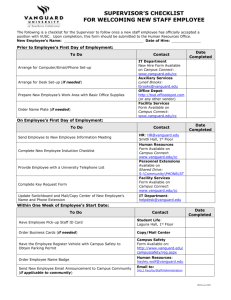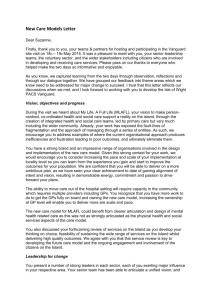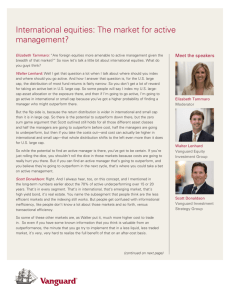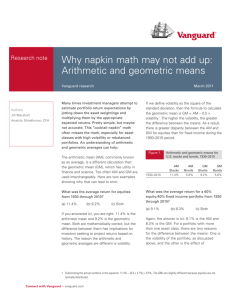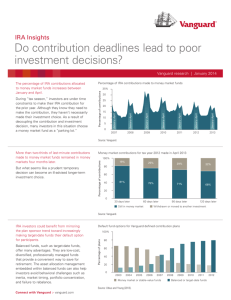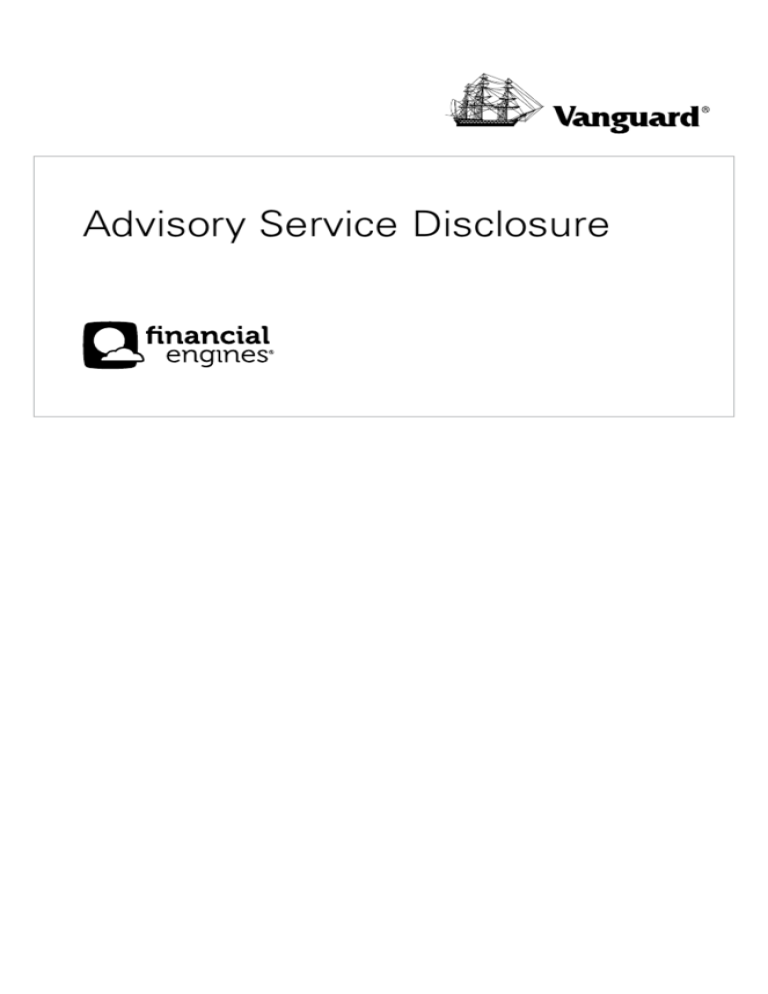
Advisory Service Disclosure
Vanguard Advisers, Inc.
100 Vanguard Blvd.
Malvern, PA 19355
Vanguard Managed Account Program (VMAP)
& Personal Online Advisor (POA)
March 29, 2013
This brochure provides information about the qualifications and business practices of Vanguard’s Managed Account Program
and Personal Online Advisor, offered by Vanguard Advisers, Inc. (VAI). If you have any questions about the contents of this
brochure, please contact us at 800-310-9228. The information in this brochure has not been approved or verified by the
United States Securities and Exchange Commission (SEC) or by any state securities authority.
Additional information about VAI also is available on the SEC’s website at adviserinfo.sec.gov.
VAI is a registered investment advisor with the SEC. Registration does not imply a certain level of skill or training.
1
Material Changes
There have been no material changes in VMAP’s or POA’s advisory business,
fees and compensation, disciplinary information, or other practices.
Contents
Advisory business...............................................................................................................................3
Fees and compensation......................................................................................................................4
Performance-based fees and side-by-side management..................................................................5
Types of clients..................................................................................................................................5
Methods of analysis, investment strategies, and risk of loss..........................................................5
Disciplinary information.....................................................................................................................7
Other financial industry activities and affiliations............................................................................7
Code of ethics, participation or interest in client transactions, and personal trading.....................7
Brokerage practices............................................................................................................................8
Review of accounts............................................................................................................................8
Client referrals and other compensation...........................................................................................8
Custody...............................................................................................................................................8
Investment discretion.........................................................................................................................8
Voting client securities.......................................................................................................................8
Financial information..........................................................................................................................8
Requirements for state-registered advisors........................................................................................8
2
Advisory business
Vanguard Advisers, Inc. (VAI), is a Pennsylvania corporation that provides investment advisory services to a wide
variety of clients. VAI was incorporated in and has been in
business since 1995. VAI is 100% owned by Goliath, Inc.,
a Delaware corporation. As such, VAI is an indirect, wholly
owned subsidiary of The Vanguard Group, Inc. (Vanguard),
the sponsor and manager of the family of mutual funds
comprising The Vanguard Group of Investment Companies
(the Vanguard Funds), which VAI typically recommends
as investments.
Vanguard Managed Account Program (VMAP or the Program)
VMAP is an investment advisory service offered by VAI.
VMAP offers portfolio management services to participants
of eligible employer-sponsored retirement plans who want
to delegate ongoing, discretionary investment management
decisions to a professional investment advisor. In making
investment management decisions for participants, VAI
relies exclusively on the proprietary software, systems,
and methodology developed and maintained by Financial
Engines Advisors L.L.C. (Financial Engines), an independent
investment advisor unaffiliated with VAI, to create target
allocations for participants.
Based on profile information concerning the participant,
including age and current investment holdings, the
Program uses Financial Engines’ software to choose a
default risk level for the participant based on the median
risk level for the participant’s peer group (a set of investors
with the same investment horizon) and determines the participant’s target allocation. The Program then invests the
participant’s account assets in accordance with the target
allocation using investments selected from among the
participant’s retirement plan’s investment options, which
may include Vanguard Funds and collective investment
trusts and third-party mutual funds, but excludes investments held through any plan brokerage window or other
restricted investments. Participants have the opportunity to
provide VAI with additional information about their desired
maximum allocation to company stock investments (not to
exceed 20% of the unrestricted balance of a participant’s
account) if the participant’s account is invested in, or eligible to invest in, such assets. Participants may also alter
certain assumptions used by the Program, such as the age
at which the participant plans to retire, if different from
the Program’s assumption, the participant’s desire to take
on more or less risk than the target allocation developed
by the Program, and may input information regarding any
savings and investments held outside of their plan that the
Program may consider when making investment decisions
3
for the participant’s plan account (although the Program
will not be responsible for providing investment advice or
management for such outside assets).
The Program maintains discretionary authority over each
participant’s account to achieve the target risk level, and
provides on-going portfolio monitoring to maintain the
target risk level through time. Participants are unable to
independently transact on their plan accounts unless they
terminate their participation in the Program. Participants
receive ongoing account Progress Reports and have
toll-free telephone access to a Managed Account Program
specialist. Participants may terminate their Program participation at any time via telephone, but account assets
remain invested in the investment options then selected
for the account until the participant takes further action.
VMAP manages $11.3 billion (as of 12/31/2012) on a
discretionary basis. VMAP does not manage assets on a
nondiscretionary basis.
Personal Online Advisor (POA)
VAI offers Personal Online Advisor (POA) to clients who
want access to online investment advice. In order to provide
investment recommendations through POA, VAI relies
exclusively on the proprietary software, systems, and
methodology developed and maintained by Financial
Engines Advisors L.L.C. (Financial Engines), an independent
investment advisor unaffiliated with VAI.
Financial Goal Forecasting. POA generates a forecast, or
estimate, of the chance of reaching a client’s financial
goals. Forecasts are based on information in our systems
including: (1) current account balance(s), (2) current savings
or contribution rates, (3) time horizon (i.e., years until goal),
and (4) investment goals (i.e., desired account balance at
the close of time horizon). The forecasts generated by POA
are reasonable estimates based on information supplied by
clients and are not guarantees of future results. Reliance
on historical and current data necessarily involves certain
inherent limitations.
Investment Recommendations. POA provides specific buy
and sell recommendations to help allocate assets among
a limited universe of investments (generally, Vanguard
Funds and other investment company securities) available
for investment. In the case of eligible retirement plans, the
plan’s sponsor selects the universe of investments available to accounts using the POA service.
Account Reviews and Monitoring. POA enables clients to
review their account(s), monitor progress toward financial
goals, receive forecasts and investment recommendations,
and access educational materials. Although POA updates
the values of most mutual funds and stocks in a client’s
account(s) daily, it is the client’s responsibility to review
and update account(s) to adjust for significant changes in
investments or personal circumstances.
POA does not recommend allocations of individual stocks,
even if they are available for investment in a client’s
account. POA does not select the investment alternatives
available for investment in a participant’s plan account.
By recommending allocations among the available investments, POA does not endorse the selection of particular
investments as available investments for a participant’s
plan account.
POA will not take into consideration any favorable tax
treatment on a participant’s company stock investment
when providing advice.
VAI only offers nondiscretionary investment advice through
POA. Clients have no obligation to accept any suggestions
provided by POA and neither VAI, Vanguard, nor Financial
Engines is authorized to make decisions regarding client
account(s) or investments. Since VAI does not provide
ongoing discretionary or nondiscretionary account management services through the POA service, it does not track its
assets under management.
Fees and compensation
The advice provided by the Program or POA will include
recommendations to sell, hold, or purchase the Vanguard
Funds. The purchase or sale of Vanguard Funds through
Vanguard (whether or not suggested by VMAP or POA)
is not subject to a load, sales charge, or commission.
However, each Vanguard Fund incurs advisory, administrative, and custodial fees, as well as other fees and
expenses that it pays out of its own assets. The advisory,
administrative, custodial, and other costs make up the
funds’ “expense ratios.” Also, some Vanguard Funds
impose purchase and redemption fees. Clients that are
invested in Vanguard Funds and collective trusts are
subject to the applicable expense ratios and any purchase
and redemption fees. Thus, acting in accordance with the
Program’s or POA’s advice to purchase Vanguard Funds
will result in the payment of fees to the Vanguard Funds,
in addition to any advisory fees assessed by VAI. Please
consult the funds’ prospectuses for information about a
specific fund’s expense ratio.
Participants in employer-sponsored retirement plans may
also indirectly bear the fees assessed by Vanguard for
recordkeeping services provided by Vanguard to a retirement plan. In connection with its services, Vanguard
receives fees that are separate from and in addition to any
fees assessed by VAI. Thus, retirement plan participants
who are receiving advice through POA and the Program
may indirectly bear the fees assessed by Vanguard in
connection with its services to the plan, in addition to any
fees assessed by VAI. Participants in employer-sponsored
retirement plans for which Vanguard provides recordkeeping services may be permitted to invest in collective trusts,
company stock funds, or certain customized investment
options for which Vanguard Fiduciary Trust Company (VFTC)
provides services and receives compensation. Because
advice provided by VAI may include recommendations
to hold or purchase these investment options, acting in
accordance with such advice may result in the payment of
fees to VFTC.
Participants in employer-sponsored retirement plans for
which Vanguard provides recordkeeping services often are
permitted to invest in non-Vanguard mutual funds. Because
the advice provided by VAI may include recommendations
to hold or purchase non-Vanguard mutual funds, acting in
accordance with such advice may result in payments to
Vanguard as compensation for participant-level recordkeeping and administrative services provided by Vanguard
for such funds. This payment may be made by the fund
company sponsoring the non-Vanguard mutual fund, by the
plan sponsor, or by the participant investing in the nonVanguard mutual fund.
The purchase or sale of third-party fund shares through
Vanguard may be subject to a load or sales charge,
although VAI generally recommends the purchase of
no-load mutual funds. Additionally, participant account
assets that are invested in third-party mutual funds are
subject to the applicable expense ratios charged by those
mutual funds. A fund’s expenses are detailed in the fund’s
prospectus. In the event that VMAP or POA recommends
the purchase or sale of non-Vanguard investments, clients
may incur additional fees, including transaction fees,
brokerage charges, loads, sales charges, commissions,
markups, or other fees or expenses. In addition, Vanguard
or its affiliates may receive other compensation, including
asset based sales charges, service fees, revenue sharing
payments, 12b-1 fees or other fees, in connection with
such investments. VAI does not take into consideration
whether Vanguard or any of its affiliates would receive
fees from its recommendation to purchase, hold, or sell
non-Vanguard investments.
4
VMAP
Each VMAP participant pays fees to VAI based on a percentage of assets in each account managed by VAI (excluding loan balances) according to the following schedule:
• 40 basis points (0.4%) per year for the first $100,000.
• 30 basis points (0.3%) per year for the next $150,000.
• 20 basis points (0.2%) per year for the next $250,000.
• 10 basis points (0.1%) per year for assets over $500,000.
There is a minimum annual fee of $60 per account. Mutual
funds held in a participant’s portfolio are subject to the normal management expenses associated with ownership of
mutual funds and other investments as disclosed in the
prospectus. Such fees are paid at the fund or trust level
and do not reduce the account level fees described on
this schedule.
Generally, the fee is charged monthly for each full month
a participant is enrolled in VMAP and is deducted on the
22nd of each month or the first business day thereafter. The
fee is deducted proportionally from the balance invested
in each mutual fund held by the participant’s account. VAI
reserves the right to increase or decrease the amount of the
fees charged, but will notify participants enrolled in VMAP
in advance of any change in the fee structure. VAI also
reserves the right to offer certain retirement plan sponsors
or participants discounted fees or other promotional pricing.
POA
Vanguard clients do not pay a fee to use POA.
Performance-based fees and
side-by-side management
Neither VMAP nor POA receives performance-based fees
for advisory services provided to clients.
Types of clients
VMAP
VMAP offers portfolio management services to participants
of eligible retirement plans. If a participant’s account
balance is less than $15,000, the participant may call and
speak with a Managed Account Program specialist at
800-310-9228 to determine whether VMAP is right for
him or her.
POA
VAI offers the Personal Online Advisor to clients, including
retirement plan participants, who want access to online
investment advice.
5
Methods of analysis, investment strategies,
and risk of loss
The Program and POA generally recommend investments
in mutual funds and investment company securities.
Although the Program and POA will recommend investment
strategies designed to be prudent and diversified, please
remember that all investments, including mutual funds and
investment company securities, involve some risk, including possible loss of principal. Be aware that fluctuations in
the financial markets and other factors may cause declines
in the value of your account. There is no guarantee that
any particular asset allocation or mix of funds will meet
your investment objectives or provide you with a given
level of income. Diversification does not ensure a profit or
protect against a loss in a declining market. There is no
assurance that you will achieve positive investment results
by utilizing the Program or POA. VAI cannot guarantee the
future performance of your investments. Please consult
the funds’ prospectuses (or other such fund guidelines) for
more information about fund-specific risks.
VMAP
The Program offers investment advice based on an investment methodology developed by Financial Engines. VMAP
uses Financial Engines’ proprietary software to analyze
historical and current returns, volatility, cross-correlations,
expenses, manager performance, and other factors to
develop individualized target allocation recommendations
for a participant’s account.
Financial Engines’ approach to portfolio construction is to
recommend a consistent diversified investment strategy
that is tailored to the needs and time horizon of each
client. The approach explicitly avoids any form of market
timing in the recommendations by using market consensus
estimates of asset class expected returns. The recommendations assume that asset classes are fairly priced by
the market and that market consensus expectations are
the best predictor of future expected returns. Financial
Engines explicitly does not attempt to identify asset classes
that may be overvalued or undervalued. Rather, Financial
Engines uses forward-looking risk premium assumptions
that are consistent with the currently observed global market portfolio allocation. As the observed market portfolio
allocation changes, the risk premium assumptions are
updated. This approach prevents subjective market timing
biases from entering into the investment allocation process
which otherwise might introduce unwanted volatility. It also
ensures that the forward-looking risk premium assumptions
are more stable over time and always consistent with
current market conditions.
The portfolio construction process consists of the
following elements:
• Estimation of core economic expectations for interest
rates, inflation, and dividend growth.
• Estimation of asset class expected returns, volatilities,
and correlations.
•Modeling of specific investment alternatives available
to the investor.
•Simulation of possible investment outcomes for
investment strategies.
• Generation of personalized portfolio recommendations;
and ongoing monitoring of portfolio efficiency and making
portfolio adjustments through time as a result of a shortening of the participant’s time horizon.
The main sources of information analyzed include historical
returns for mutual funds, individual equities, and broad
asset categories (e.g., large-capitalization U.S. equity
returns, money market returns, foreign equity returns, etc.),
security-specific information, such as mutual fund expense
ratios, and current market data and information.
Generally, the methodology used takes a long-term view of
investment management. However, it may recommend
trading or short-term purchases depending on market
conditions, changes in individual preferences, and other
relevant criteria.
The Program will invest a participant’s account assets only
in investments available through the employer retirement
plan, which are primarily mutual funds but also may include
exchange-listed equity securities, guaranteed investment
contracts issued by insurance companies and banks, or
other securities. The Program will not invest account
assets in investments available through a plan’s brokerage
window (if applicable). The Program will not invest account
assets in the following types of securities, but can consider
them as part of its portfolio analysis if such securities are
already held in an account: securities traded over-thecounter, securities traded in foreign markets, warrants,
corporate debt securities, commercial paper, certificates of
deposit, municipal securities, variable life insurance products, variable annuities, U.S. Government securities, options
contracts on securities, and futures contracts on intangibles.
To the extent that company stock investments are permitted in a participant’s account, such investments may not
exceed 20% of the unrestricted account balance (or such
other maximum allocation applicable to the Program for an
account). Participants may direct VAI to effect transactions
involving unrestricted company stock investments in an
account. However, VAI may decrease the amount of com-
pany stock investments held in an account, if any, taking
into consideration any preferred maximum target allocation
that the participant has specified. VAI may be precluded
from making allocation changes with respect to company
stock investments at any time that VAI may have material
nonpublic information about such employer or its securities.
As stated above, the Program’s analysis of equity securities
generally assumes an efficient market in which stock prices
are fairly valued. Thus, VAI does not change allocations
with respect to company stock investment based on fundamental analysis of the security value compared to current
prices. Instead VAI determines the allocation for company
stock investments after analyzing the risk/return impact
of concentrated holdings of such assets. The Program will
not take into consideration any favorable tax treatment on
company stock investment when providing advice.
POA
POA offers investment advice based on an investment
methodology developed by Financial Engines. POA uses
Financial Engines’ proprietary software to analyze historical and current returns, volatility, cross-correlations, and
other factors to develop individualized target allocation
recommendations. The Financial Engines software employs
returns-based style analysis and optimization, among other
techniques, to develop its target allocation recommendations. The main sources of information analyzed include
historical returns for mutual funds, individual securities, and
broad asset categories (e.g., large-capitalization U.S. equity
returns, money market returns, foreign equity returns, etc.),
security-specific information (such as mutual fund expense
ratios), and current market data and information.
POA generates a forecast through the use of simulations,
which are hypothetical economic scenarios based upon
analysis of historic and current returns, volatility, crosscorrelations, and other factors. POA creates thousands of
hypothetical future economic scenarios to evaluate how
account investments might perform under a variety of
circumstances, including changing interest rates, inflation,
and market conditions. The forecast is a percentage figure
representing the number of scenarios in which the
client’s account(s) would be sufficient to meet or exceed
the investment goal at the end of the time horizon. POA
also can include information about stock options in a
financial goal forecast.
For more detailed information on Financial Engines
and its investment methodology, please go to
financialengines.com for a copy of its brochure.
6
Disciplinary information
VAI has no disciplinary information to disclose.
Other financial industry activities and affiliations
The Program and POA mitigate the competing interests
that could arise between VAI and our clients as a result of
recommendations to hold or purchase Vanguard funds or
trusts and non-Vanguard mutual funds by relying exclusively
on the proprietary systems and methodology developed and
maintained by Financial Engines, an independent, thirdparty, federally registered investment advisor, to provide
the Program and POA. Specific VAI affiliations follow:
The Vanguard Group, Inc. (Vanguard)
VAI is 100% owned by Goliath Inc., a Delaware corporation, which is wholly owned by Vanguard. Vanguard, also a
registered investment advisor, provides a range of investment advisory and administrative services to the Vanguard
family of mutual funds (Vanguard Funds). Vanguard is truly
a “mutual” mutual fund company. It is owned jointly by the
funds it services and thus, indirectly, by the shareholders
in those funds. POA and the Program may recommend the
purchase of Vanguard funds serviced by Vanguard. Because
the advice provided by the Program and POA may include
recommendations to hold or purchase Vanguard funds, acting in accordance with such advice will subject the participant to the expense ratios charged by any Vanguard Funds
held in the participant’s account, as well as any purchase or
redemption fees assessed by those Vanguard Funds.
Vanguard Marketing Corporation (VMC)
Shares of the Vanguard Funds are marketed and distributed
by Vanguard Marketing Corporation (VMC), a registered
broker-dealer that is a wholly owned subsidiary of
Vanguard, and an affiliate of VAI. VMC’s marketing and
distribution services are conducted on an at-cost basis in
accordance with the terms and conditions of a 1981 exemptive order from the Securities and Exchange Commission,
which permits Vanguard Funds to internalize and jointly
finance such activities. Each Vanguard Fund (other than a
fund of funds) or each share class of a fund (in the case of a
fund with multiple share classes) pays its allocated share of
VMC’s marketing costs. VMC does not receive transactionbased compensation in connection with the distribution of
the Vanguard Funds.
When giving advice to clients, VAI will recommend the purchase of Vanguard funds distributed by VAI’s affiliate, VMC.
Since VMC performs its marketing and distribution services
on an at-cost basis and does not receive transaction-based
7
compensation in connection with the distribution of
the Vanguard Funds, no competing interests arise from
VAI’s affiliation with VMC. Certain members of VAI’s
management are registered representatives of Vanguard
Marketing Corporation.
Vanguard Fiduciary Trust Company (VFTC)
VAI is also affiliated with Vanguard Fiduciary Trust
Company (VFTC), a limited-purpose trust company incorporated under the banking laws of the Commonwealth of
Pennsylvania and a wholly owned subsidiary of Vanguard.
VFTC serves as trustee and investment advisor for certain
collective investment trusts offered by Vanguard as eligible
investments options by some retirement plans. POA and the
Program may recommend the purchase of Vanguard collective investment trusts serviced by VAI’s affiliate, VFTC.
Financial Engines Advisors L.L.C. (Financial Engines)
The Vanguard Group has engaged Financial Engines to provide subadvisory services to the Program and POA. Financial
Engines is an independent, third-party, federally registered
investment advisor that does not sell investments or receive
commission for the investments it recommends.
Code of ethics, participation or interest in
client transactions, and personal trading
VAI operates under a Code of Ethics that complies with
Rule 17j-1 of the Investment Company Act of 1940 and Rule
204A-1 of the Investment Advisers Act of 1940.
The Code sets forth fiduciary standards that apply to all
employees, incorporates Vanguard’s insider-trading policy,
and governs outside employment and receipt of gifts.
Additionally, the Code imposes restrictions on the personal
securities trading of Vanguard employees, as well as
reporting requirements. The trading restrictions and reporting requirements are more involved for employees that have
access to information about Vanguard Fund trading activity
or Vanguard client trading activity and are designed to
ensure that Vanguard employees do not misuse fund and/or
client information for their own benefit.
Vanguard will provide a copy of its Code of Ethics to any
client or prospective client upon request at no charge.
Please see the section of this brochure titled “Other
Financial Industry Activities and Affiliations” for a discussion of VAI’s affiliations with other Vanguard entities, and
how those affiliations may impact clients of VAI.
Brokerage practices
Investment discretion
VMAP and POA do not provide recommendations on
individual securities. Therefore, VAI does not select or
recommend broker-dealers for client transactions in
connection with these services.
VMAP
VMAP is a discretionary service in which participants
allow VAI full authority to invest their retirement plan
account assets from among the participant’s retirement
plan’s investment options as the Program deems advisable
relying on the proprietary software, systems, and methodology developed and maintained by Financial Engines.
Participants grant VAI discretion by agreeing to the terms of
the VMAP Service Agreement. The Program has the discretionary authority (subject to the terms of the participant’s
plan) to (1) invest any monies that the participant designates for inclusion within their plan account; and (2) initiate
exchange transactions among the participant’s retirement
plan’s eligible investment options.
Review of accounts
The Vanguard Managed Account Program provides clients
with automatically generated quarterly progress reports
that show transactions, if any, and account performance.
The Program also provides ongoing monitoring of portfolio
efficiency and makes portfolio adjustments through time
as a result of a shortening of the participant’s time horizon.
The investment allocations will generally not rebalance
to fixed proportions, but instead to proportions that vary
depending on those observed in the composition of the
global market portfolio. For an investor with average risk
tolerance who is invested in a portfolio that replicates the
market portfolio, there will generally be minimal rebalancing required. Their portfolio allocations will have shifted
due to market movements in the same proportions as
their preferences.
POA reviews accounts in accordance with the forecasting
and monitoring services mentioned above.
As owners of Vanguard Fund shares through an employersponsored retirement plan, VAI clients will receive or have
access to communications with respect to those funds.
These communications include transaction confirmations,
quarterly account statements, prospectus updates, annual
and semiannual reports, and proxy statements relating to
their fund holdings (as appropriate), as well as general
Vanguard newsletters, e-mails, and other communications.
Client referrals and other compensation
VAI receives no economic benefits from persons who are
not clients for providing investment advice or advisory
services to its clients.
VAI does not directly or indirectly compensate any person
who is not a supervised person for client referrals.
Custody
The Vanguard Group, Inc., the transfer agent of the
Vanguard Funds, acts in the capacity of a qualified custodian for those funds and sends quarterly, or more frequent,
account statements directly to VAI clients. Clients may
also receive statements and reports or progress reports
from the VMAP service. Clients should carefully review and
compare these account statements and contact VAI with
any questions.
VAI’s discretionary authority to buy or sell securities,
including the amount to be bought or sold, is based on
the participant’s risk preferences, restricted plan account
positions, participant specified constraints, outside account
information (if provided), or other factors determined by
the Program to be appropriate.
POA
POA does not have discretion over clients’ accounts.
Voting client securities
VAI will not vote or exercise similar rights for client securities. For participants in employer-sponsored retirement
plans, the responsibility for the exercise of all voting or
similar rights associated with any security or other property
held in the portfolio shall be outlined by the plan. VAI will
not advise or act for the client in any legal proceedings,
including bankruptcies or class actions, involving securities
held or previously held by the portfolio or the issuers of
those securities. Proxies related to plan holdings will be
delivered directly by the issuer of the security, the custodian or its agent.
Financial information
VAI is not aware of any financial condition that is
reasonably likely to impair its ability to meet contractual
commitments to clients.
Requirements for state-registered advisors
VAI is a federally registered investment advisor.
8
Vanguard Advisers, Inc.
100 Vanguard Blvd.
Malvern, PA 19355
Vanguard Managed Account Program (VMAP) &
Personal Online Advisor (POA)
March 29, 2013
This brochure supplement provides information about the Vanguard Managed Account Program and Personal Online Advisor
advisory services under Vanguard Advisers, Inc. (VAI), the registered investment advisor, that supplements the Vanguard
Managed Account Program and Personal Online Advisor brochure. You should have received a copy of that brochure. Please
contact Vanguard at 800-523-1188 if you did not receive VAI’s brochure or if you have any questions about the contents of
this supplement.
9
Educational background and business experience:
As subadviser for the VMAP and POA services, the Investment Committee at Financial Engines has overall responsibility for the
oversight of advisory and investment management services, including the application of Financial Engines’ proprietary investment
methodology that generates its advice recommendations and portfolio management. The committee meets regularly (typically
weekly) to review and approve methodology and parameter updates, investment policies, new service and participant communications designs, and ongoing monitoring of member portfolio allocations. The committee is comprised exclusively of Financial
Engines employees with a broad range of experience and expertise. Most members of the committee have long tenure with
Financial Engines, and the majority have been integrally involved in the development of the advisory platform for many years.
Financial Engines (FE) Investment Committee:
Christopher L. Jones (1967), Chairman - A.B. Economics, Stanford University; M.S. Engineering - Economic Systems,
Stanford University; M.S. Business Technology, Stanford University
• Executive Vice President, Chief Investment Officer, Financial Engines Advisors L.L.C.
• Executive Vice President, Chief Investment Officer, Financial Engines, Inc.
• Mr. Jones has been with FE since 1996.
Jason S. Scott (1967) - B.S. Economics, Texas A&M University; Ph.D. Economics, Stanford University
• Managing Director, Retiree Research Center, Financial Engines Advisors L.L.C.
• Managing Director, Retiree Research Center, Financial Engines, Inc.
• Vice President, Financial Research, Financial Engines Advisors L.L.C.
• Vice President, Financial Research, Financial Engines, Inc.
• Mr. Scott has been with FE since 1997.
Garry W. Hallee (1961) - B.S. Electrical Engineering, Stanford University; M.S. Electrical Engineering, Stanford University
• Executive Vice President, Technology and Service Delivery, Financial Advisors L.L.C.
• Executive Vice President, Technology and Service Delivery, Financial Engines, Inc.
• Executive Vice President, Technology, Financial Engines Advisors L.L.C.
• Executive Vice President, Technology, Financial Engines, Inc.
• Mr. Hallee has been with FE since 1999.
Wei-Yin Hu (1967) - A.B. Economics, Stanford University; Ph.D. Economics, Stanford University
• Director, Financial Research, Financial Engines Advisors L.L.C.
• Director, Financial Research, Financial Engines, Inc.
• Mr. Hu has been with FE since 2000.
Gregory D. Stein (1970) - A.B. Economics, Stanford University; A.M. Economics, Stanford University
• Director, Financial Quality Assurance and Financial Technology, Financial Engines Advisors L.L.C.
• Director, Financial Quality Assurance and Financial Technology, Financial Engines, Inc.
• Mr. Stein has been with FE since 1999.
Robert L. Young (1966) - A.B. Economics, Georgetown University; M.B.A., Stanford University
• Director, Investments Group, Financial Engines Advisors L.L.C.
• Director, Investment Group, Financial Engines, Inc.
• Mr. Young has been with FE since 1998.
There is no disciplinary information, other business activities, or additional compensation to report for any
of the above persons.
10
­­­Participant Education
P.O. Box 2900
Valley Forge, PA 19482-2900
Connect with Vanguard ® > 800-310-9228
Financial Engines is a trademark of Financial Engines, Inc.
© 2013 The Vanguard Group, Inc.,
and Financial Engines, Inc. All rights reserved.
BBBBCZYK 032013
VMAPSG03


